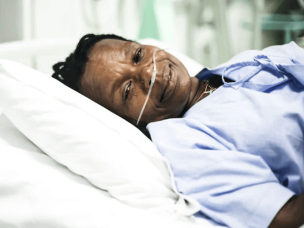Sickle Cell Disease
What People With Sickle Cell Disease Need to Know About COVID-19
People with sickle cell disease are at increased risk for severe complications from COVID-19, an expert says. “Many patients experience a pain crisis, also known as a vaso-occlusive crisis, early in COVID-19 infection before respiratory symptoms develop,” said Dr. Jennie Hart, clinical director of pediatric hematology/oncology at Herman and Walter Samuelson Children’s Hospital at Sinai...
Transplant Beneficial for Kidney Failure in Sickle Cell
Patients with kidney failure who receive a kidney transplant, including those with sickle cell disease, have lower mortality, according to a study published online Feb. 25 in the Clinical Journal of the American Society of Nephrology. Sunjae Bae, K.M.D., M.P.H., from the Johns Hopkins School of Medicine in Baltimore, and colleagues studied all adults with...
Kidney Transplant Disparities in Sickle Cell Disease
According to research performed at Johns Hopkins School of Medicine and Bloomberg School of Public Health in Baltimore, Maryland, patients with kidney failure secondary to sickle cell disease are less likely to receive kidney transplants than patients with chronic kidney disease from other causes, even when registered for a kidney transplant. Although patients with sickle...
New Drug Shows Promise for Sickle Cell Disease
IMR-687 is classified as a phosphodiesterase 9 (PDE9) inhibitor. By blocking selective phosphodiesterase inhibitors, PDE9s increase cellular adenosine monophosphate (cAMP) and cellular adenosine triphosphate (cATP), allowing cells to function in ways previously inhibited. Before clinical testing, IMR-687 was shown to reduce erythrocyte sickling in vitro. In patients treated with IMR-687, fetal hemoglobin levels increased when...
Curing Sickle Cell Disease by DNA Modification
Sickle cell disease and beta-thalassemia are caused by gene mutations affecting hemoglobin. The former causes erythrocytes to assume a sickle shape, often causing deformed red blood cells to clog arteries. As a result, organs such as the lungs, heart, kidneys, and liver are deprived of oxygen, contributing to significant pain. Hemoglobin molecules in beta-thalassemia carry...
1 in 5 Patients on Kidney Dialysis Say No to COVID-19 Vaccine: Study
About 20% of Americans on kidney dialysis are reluctant to get a COVID-19 shot, according to a new study. Kidney failure patients on dialysis are at increased risk for COVID-related complications that could lead to hospitalization and death, so it’s important for them to be vaccinated, researchers said. “Finding that 80% of patients on dialysis...
Gene Therapy for Sickle Cell Did Not Cause Patient's Leukemia
There is no evidence that a promising gene therapy for sickle cell disease triggered leukemia in a patient, according to the company testing the experimental treatment. Bluebird Bio announced a few weeks ago that a sickle cell patient treated with the gene therapy five years ago in a clinical trial had developed acute myeloid leukemia...
AHA News: Black Health Activists Gain Momentum From Pandemic and Build on History
When Khadijah Ameen and her fellow health activists gather in community groups in Martin Luther King Jr.’s hometown of Atlanta, everyone is in a circle. It connects to their central message: Achieving a society in which all Black lives matter means Black health must matter, too. Racial health disparities can lead to preventable suffering and...
Patients With Sickle Cell Disease Often Overlooked for Life-Saving Kidney Transplants
People with kidney failure related to sickle cell disease are less likely to receive a transplant than those without sickle cell disease, but it could be life-saving for them, a new study finds. Sickle cell disease is a risk factor for kidney failure, and adults with sickle cell-related kidney failure who are on long-term dialysis...
More Medical News














